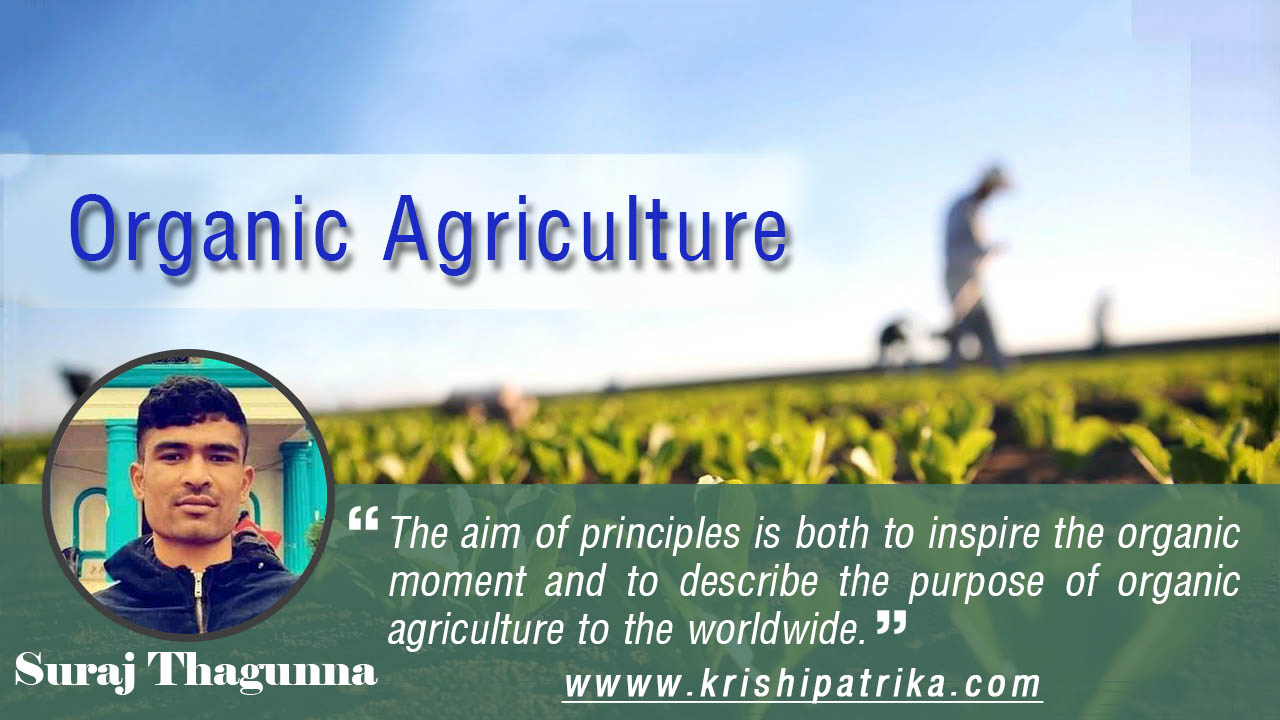
The principles of organic agriculture were established by the general assembly of international federation of organic agriculture movements (IFOAM) in 25 September 2005. The principles were developed during an intensive 2 year participatory process. The aim of principles is both to inspire the organic moment and to describe the purpose of organic agriculture to the worldwide.
The principles are intended to apply to agriculture in the broadest sense including the way people tend soil, water, plants and animals in order to produce, prepare and distribute goods. There are four principles of organic farming
1. Principle of health
It is not simply the absence of illness, but the maintenance of physical, mental, social and ecological well-being. Immunity, resilience, and regeneration are key characteristics of health. The role of organic agriculture, weather in farming, processing, distribution, or consumption is to sustain and enhance the health of ecosystem and organism from the smallest in the soil to human being. In particular, organic agriculture is intended to produce high quality, nutritious food that contributes to preventive health care and well-being. In view of this it should avoid the use of fertilizers, pesticides, animal drugs and food additives that may have adverse health effect.
2. Principle of ecology
This principle roots organic agriculture within living ecology systems. It states that production is to be based on ecological process and recycling. Food and wellbeing are achieved through the ecology of the specific production environment. For example in the case of crops this is the living soil; for animals it is the farm ecosystem for fish and marine organisms, the aquatic environment.
Organic farming, pastoral and wild harvest system should fit the cycles and ecological balance in nature. The cycles are universal but their operation is site specific. Organic management must be adapted to local condition, ecology, culture and scale. Inputs should be reduced by reuse, recycling and efficient management of materials and energy in order to maintain and improve environment quality and conserve resource. Organic agriculture should attain ecological balance through the design of farming systems, establishment of habitats and maintenance of genetic and agricultural diversity. Those who produce, process, trade, or consume organic product should protect and benefit the common environment including landscapes, climate, habitats, biodiversity, air and water.
3. Principle of fairness
Fairness is characterized by equity, respect, justice of the shared world, both among people and their relations to other living beings.
This principle emphasizes that those involved in organic agriculture should conduct human relationship in a manner that insure fairness at all levels and to all parties including farmer, workers, processors, distributors, traders and consumers. Organic agriculture should provide everyone involved with a good quality of life and contribute to food soverigenity and reduction of poverty. It aims to produce sufficient supply of good quality food and other products. According to this principle, animal should provide with the condition and opportunities of life that accord with their philosophy, natural behavior and wellbeing. Natural resources should be consumed in such a manner that they are socially and ecologically just and sustainable. Farmers can enhance production and productivity by new technology but this should not affect health and ecology.
4. Principle of care
This principle states that precaution and responsibility are the key concerns in management, development and technology choices in organic agriculture. Science is necessary to ensure that organic agriculture is healthy, safe and ecologically sound. However scientific knowledge alone is not sufficient. Practical experience, accumulated wisdom and traditional and indigenous knowledge offer valid situations, tested by time. Organic agriculture should prevent significant risk by adopting appropriate technologies and rejecting unpredictable ones, such as genetic engineering. Decision should reflect the values and needs of all who might be affected, through transparent and participatory process.









